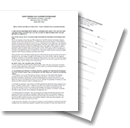Identify your symptoms of anxiety by checking the following symptoms.
______I feel keyed up and tense. My mind is racing.
______I can’t stop thinking about______________.
______I believe my pulse rate is faster than normal and that my blood pressure is up.
______I notice there is tightness in my chest or shoulders.
______Something seems incredibly important right now and I am thinking about it nonstop.
______I am worrying and I feel like something bad is about to happen.
______I have a “nervous stomach” and I might be blushing or sweating.
______I feel a great need to move like I could run a race or get into an argument easily right now.
______I am worried about meeting a new person or going to a social event.
If you have social anxiety, you may have a few or all of the difficulties described below:
- you become very nervous when meeting new people or you often avoid situations where new people are present.
- you keep trying to talk yourself into talking to more people but still are unable to do this.
- you spend far more time alone than you would like to and cannot seem to change this.
- you often freeze up when talking.
- you may have difficulty with dating issues or in communicating with your partner.
Finding out about your social anxiety and in which situations you are most likely to feel it:
True or False
- I find it very difficult to talk to new people.
- I lack confidence with people.
- I feel very tense and nervous when I try to initiate a conversation
- When I have social anxiety at work, I have difficulty talking to other people.
- I often tense up and forget what I was about to say when trying to talk to someone new.
- I am especially nervous when talking to someone I would like to date.
- I often replay entire dialogues in my mind, wishing I had said something different.
- people see me as very quiet but I do not want to be seen this way.
- I often just avoid situations where I might have to talk to new people.
- When I have social anxiety and I want to ask someone to get together with me I just can’t get the words out.
Significant life events can lead to anxiety such as loss of a job, a car accident, or divorce. Anxiety can occur even if these events are positive e.g. promotion at work or entering a new relationship.
Anxiety is often connected with negative thoughts, and a cycle can be set up by thinking negative or fearful thoughts and as a result becoming anxious and then thinking more negative thoughts..
People who are anxious often try to avoid that which makes them feel anxious.
In Panic Attacks the anxiety and the sensations in the body can feel life threatening.
Sometimes people become depressed because the anxiety that they have been experiencing has brought about major life limitations such as being unable to fly or to drive on freeways.
Post-traumatic Stress disorder can be a cause or a contributing factor to anxiety. People who have experienced extreme trauma may become quite anxious when they have even the slightest thought or memory about the traumatic event.
There is help available for people who have social anxiety. You can have the support and learn the skills you need to be more comfortable around others.
Getting Help
When I work with people who have social anxiety in my counseling practice, we work on becoming less socially anxious with coaching and counseling. This effort involves learning to relax in social situations and developing more effective social skills.
For a counseling appointment, call Dr. Nancy Wesson at (650) 965-7332 or email Dr.Nwesson@sbccglobal.net.
Counseling can help you . . .
- Become more at ease in social situations. Become more comfortable meeting new people. Work through past experiences that may be interfering with new relationships. Learn about how relationships work and how to have a healthy relationship. Develop an internal support system to reduce stress in social situations.
- Develop an individually designed plan and set of steps for increasing social contact.
More about Having Social Anxiety
Having social anxiety interferes with relating to people and having social relationships. Social anxiety can be replaced by more socially effective behavior and a socially anxious person can learn to relax in social situations.
Counseling and supportive coaching includes:
- Taking small steps toward improving social contact and practicing new social behavior. The steps need to be small enough to allow one to increase skills and confidence level.
- Learning to manage and eventually eliminate anxiety, tension, and nervousness. There are several skills that can be taught to reduce stress and tension around people.
- Learning how to meet people, how to date, and how to develop a satisfying relationship




 For a consultation or appointment call or text:
For a consultation or appointment call or text: